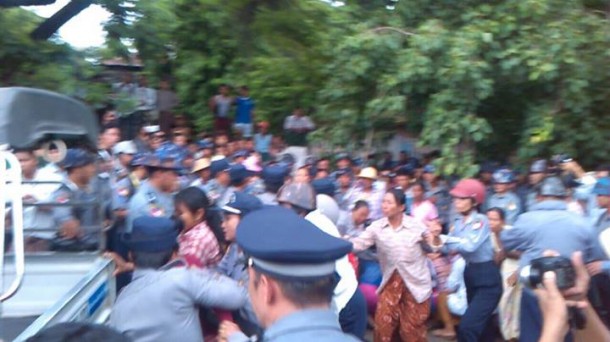Activist Naw Ohn Hla remains behind bars and has been charged with staging an unauthorized demonstration after she was arrested along with nine other women who attempted to prevent her from being detained near the controversial Letpadaung copper mine.
Police in Monywa, Sagaing Division, dragged protester Naw Ohn Hla and nine of her supporters—all women who have called for the suspension of the Chinese-back Letpadaung mine—to a waiting police truck and drove them to the Monywa police station on Tuesday.
The nine women, from the villages of Tone, Moegyopyin and Hsetae, were released later that same day. Naw Ohn Hla, a prominent Rangoon-based activist who has lent her support to Letpadaung area residents, was sent to the Monywa prison, according to Yin Yin Nwe, a resident of Tone who was among the nine other women arrested.
“We were going to see the solo protest of Daw Naw Ohn Hla, but when we got there, the police forces had arrived to arrest Daw Naw Ohn Hla. We did not let them arrest her. We pulled her [away from the police officers], then the police arrested everyone who had pulled her away from them. They dragged us like dogs or pigs,” she said.
Local villagers and activists had planned to protest, and say they sought government permission to do so nine times, but authorities rejected their request. Naw Ohn Hla proceeded with the protest despite the failure to receive government approval.
“The head of the police, Kyaw Kyaw Nyunt, told us that we are charged with Section 18 [assembling without government permission] and told us to sign a pledge that we will appear in court when they summon us,” said Yin Yin Nwe. “But we were not protesting, we were just going to support Daw Naw Ohn Hla.”
The victims said they signed the pledge because the police threatened to imprison them.
“He said we will be sent to the prison if we do not sign,” she said. “We were afraid of going to prison, so we signed. They sent us back home in the early evening.”
Naw Ohn Hla was arraigned at the Monywa provincial court and will stand trial on Aug. 27. Township administrator Kyu Aye will act as plaintiff in the case.
Naw Ohn Hla, an outspoken activist and former political prisoner who leads the Democracy and Peace Women’s Network, is also facing multiple trials in several Rangoon townships on similar charges.
Her lawyer Aung Thein said her detention in Monywa meant that she would not be able to appear at the trials in Rangoon. She was released on bail for her prior charges in the former capital.Burma’s various courts practice different policies concerning defendants, with some allowing bail and others not.
“She will miss the trials in Rangoon as she is now detained in Monywa,” Aung Thein said. He said other lawyers in Mandalay would help represent her in the Monywa case because he is occupied with other trials in lower Burma.
Naw Ohn Hla is among a growing contingent of women who have been detained and charged under various criminal statutes for their roles in land rights-related campaigns.
In June, two women activists—Myint Myint Aye and Khin Mi Mi Khaing—were detained for supporting farmers whose lands were confiscated in Pegu Division. They have been denied bail since their arrest in June 11.
The following month, Kachin politician Bauk Ja, a member of the National Democratic Force who has been campaigning against land grabs in the Hukaung Valley, was arrested on negligent homicide charges that her supporters say are politically motivated. Bauk Ja has been detained since July 18.
A women’s group on Wednesday criticized the recent crackdown on female protesters and activists, and called for their release.
“This violent and degrading treatment of peaceful women activists is a disgrace. It lays bare the hypocrisy of the government’s democratic reform process,” said Tin Tin Nyo, the general secretary of the Women’s League of Burma.
“They [the Letpadaung protesters] are not breaking any laws, except practicing their right to assemble—which they had asked permission for but were rejected,” Tin Tin Nyo told The Irrawaddy.
Letpadaung protesters have faced harsh treatment from law enforcers since they began protests a year ago. The most high-profile case involved a police crackdown in November on local residents and monks, when officers used white phosphorous to disperse the demonstrators, injuring more than 100 people.
Opponents of the project object to its continuation on the grounds that the mine poses social, health and environmental concerns.
Yin Yin Nwe said the nine women detained on Tuesday were seeking justice for the law enforcement personnel responsible for their arrest.
“The authorities said we broke the Assembly Law, but they treated us in an inhumane manner and I would like to ask who will take responsible for suing these public servants who abused us, the peaceful villagers.”

















